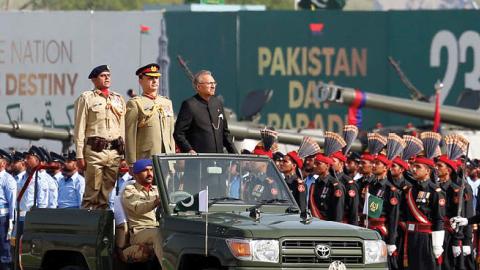There’s a familiar saying: Fool me once shame on you, fool me twice shame on me. “Fool me three times, however, and all is forgiven” has become a good description of U.S. policy toward Pakistan in the post-Cold War era.
For more than three decades, our supposed ally in South Asia has systematically lied to and manipulated successive presidential administrations — Republican and Democratic — in ways that have made the U.S. and the world less safe. Islamabad has been the recipient of more than $33 billion in American assistance since 2002, including $14 billion to combat terrorism and insurgents in the region even while Pakistan has been busily doing the opposite.
In the wake of the debacle of withdrawing U.S. troops from Afghanistan, it’s time to radically reassess our policy toward Pakistan. It’s time for policymakers, past and present, to explain why we continue to provide assistance to a country that cozies up to our enemies; has proliferated nuclear technology to some of the worst governments on earth; and has betrayed our friendship time and again.
Fool me once? That was when Pakistan, having violated commitments to the U.S. in the 1980s to not build a nuclear weapon, not only did so but proceeded to proliferate that knowledge via the A.Q. Khan network. That proliferation network secretly armed North Korea, and would have armed Iraq and Libya if the U.S. hadn’t intervened.
Fool me twice? Following the U.S. invasion of Afghanistan, Pakistan gave safe haven to the most wanted man in the War on Terror, Osama bin Laden, for nearly a decade until U.S. special forces tracked him down in 2011. In addition, Pakistan’s military and secret service have continuously protected and assisted terrorist groups, including the Haqqani network and the Taliban, even as U.S. and NATO forces were fighting and dying to suppress the same groups.
The third egregious breach in trust has been Pakistan’s increasingly cozy ties to China. The government accepted a $60 billion handout from China in 2013, formalizing the China-Pakistan Economic Corridor (CPEC) as part of China’s Belt and Road global infrastructure initiative. Today, Pakistan is all but a Chinese client state. For example, we know that China is training Pakistan’s intelligence services and that the People’s Liberation Army and Pakistani army are forging close links, including conducting joint military exercises and buying Chinese tanks, unmanned aerial vehicles (UAVs) and other military equipment.
These aren’t the actions of an ally. The sad truth is, Pakistan has been playing a clever double game with the U.S., which has paid off handsomely for Islamabad but not for the peace and security of the region.
Given that history, and in the wake of Pakistan’s support of the Taliban and its top security chief’s journey to Kabul to bless the new Afghan government, Washington should stop sales of military equipment to Pakistan and all economic assistance, and induce allies such as Britain and Saudi Arabia to do the same; migrate Pakistan from the “grey list” to the “black list” for the Financial Action Task Force’s sanctions against countries providing funding for terrorism, alongside Iran and North Korea; and impose sanctions on individual Inter-Services Intelligence (ISI) and Pakistan Army officials, including suspending travel to the U.S. and freezing bank assets, just as we do with other officials involved in state-sponsored terrorism networks.
Of course, Pakistan holds a wild card that, until now, has been the excuse for staying America’s hand: its nuclear arsenal. Critics argue that taking tough actions against Islamabad will encourage its leaders to “go rogue” with their nuclear program, including possibly supplying terrorist groups with nuclear technology.
The fact is, Pakistan has been somewhat of a rogue nuclear player for some time. It never has signed the Nuclear Non-Proliferation Treaty or the Comprehensive Test Ban Treaty. Indeed, as the Iranian and North Korean nuclear programs have demonstrated, there are always clandestine steps that can be taken that will limit or thwart Pakistan’s nuclear ambitions — provided the U.S. has the will to use them.
The situation in Pakistan is not entirely bleak. There are those in the army and political institutions who understand that their country’s cozying up to terrorist groups, and to China, can only damage their country in the long term. As John Bolton put it in a recent Washington Post article, “Pakistan is the only government consisting simultaneously of arsonists and firefighters.”
U.S. policy needs to encourage the firefighters to put the arsonists permanently out of business. So far, our pandering has allowed Pakistan to help set the rest of the region on fire. It’s time to make Pakistan realize we no longer will treat them as a friend or ally, until and unless they stop behaving like an enemy.
Read in The Hill















